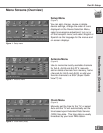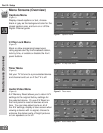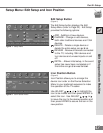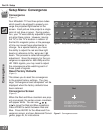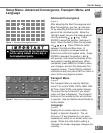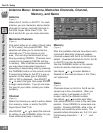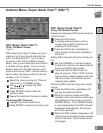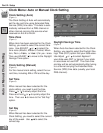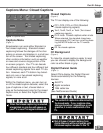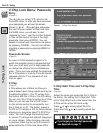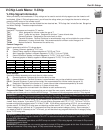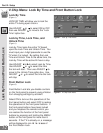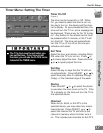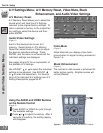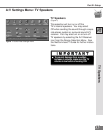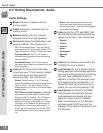
49
49
Part III: Setup
Closed Captions
When Text closed captioning is selected,
a large black or gray box will appear on
your TV screen if no signal is broadcast.
The content of captions is determined by
the broadcaster. If your captions show
strange characters, misspellings, or odd
grammar, it is not a malfunction of the
TV.
Captions Menu: Closed Captions
Captions Menu
(Figure 1)
Broadcasters can send either Standard or
Text closed captioning. Standard closed
captioning follows the dialogue of the char-
acters on-screen and displays in a small sec-
tion of the screen. Text closed captioning
often contains information such as weather
or news and covers a large portion of the
on-screen program. Your TV can decode
four different standard and four different text
closed captioning signals from each TV sta-
tion. However, each TV station may broad-
cast only one or two closed captioning
signals, or none at all.
Within the Captions menu, you can turn on
or off the closed caption decoder, select the
type of captions or text, choose black or
gray as the background color for the closed
caption area, or select the Digital Channel
Guide.
Closed Captions
(Figure 1)
The TV can display one of the following:
CC1, CC2, CC3, or CC4 (Standard
closed captioning signals).
Text1, Text2, Text3, or Text4 (Text closed
captioning signals).
On if mute. Closed captions when mute.
When selected, the standard closed cap-
tioning signal (CC1) will turn on/off by press-
ing the MUTE button on the TV remote
control.
Off. No closed captions.
CC Background
(Figure 1)
To make the closed captions easier to read,
you can choose to display the background
color as either black or gray.
Figure 1. Captions menu
Not all types of closed captions from
digital channels will be compatible with
the closed caption decoder in this TV.
Digital Channel Guide
(Figure 1)
Select ON to display the Digital Channel
Guide automatically for the following
devices:
Ant-DTV
digital recorders
1394 cable box
(See NetCommand Guide)



